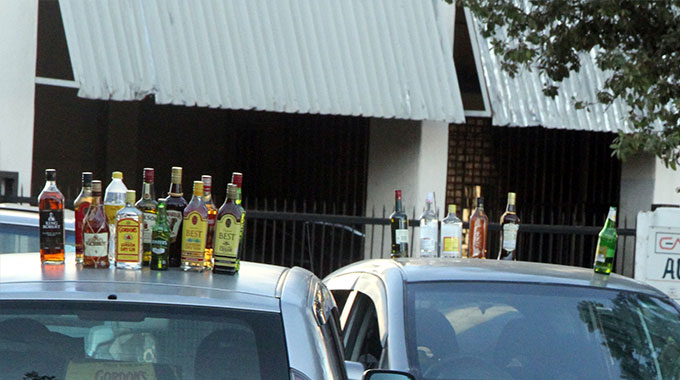From backroom bottle stores to home deliveries … How underground liquor sales thrive in lockdown
By Bruce Ndlovu
While others are bemoaning the loss of business of life during quarantine, the woman who calls herself Mavis is beaming with happiness in Bulawayo.

The last three weeks have been profitable for her. A glance, and that is all a potential buyer gets, at her kitchen floor reveals the reason why.
Boxes full of Jameson Irish Whiskey, Gordon’s London Dry Gin and 1818 Smirnoff vodka litter her kitchen floor. These brands, whose names only are enough to make any imbiber salivate, battle for space in the tiny kitchen of her one-bedroom apartment on the outskirts of the Bulawayo CBD.
Despite the bottles in front of this reporter, she proudly proclaims that she has run out of Gordon’s, one of her priced products.
“All that you see here has been bought. People have been ordering boxes so we are now officially out of gin stock. The best that you can do now is some 1818 but with the way that people are buying I don’t expect that to last long too.”
Gin has been one of the most in-demand products during the nationwide lockdown as imbibers seek to quench their thirst and fend off boredom while dodging the deadly Covid-19.
“What I can say is that we noticed a spike in the demand for gin around late 2018 to the start of 2019,” said Mduduzi Mdlongwa of 3D Events.
“Now at our bars Gordons is the biggest seller. It moves very fast and that has been the trend for a while and I guess it has continued during this quarantine. It’s surprising to us because when we were growing up in the 90s, we only used to know Gordon’s as the drink that old men used to love to drink.
“Now it’s the younger people that love it and other gin brands. I would say this is because of its affordability and the universality gin brings because it is liked by both men and women which is rare.”
By yesterday afternoon, most underground retailers of gin had run out of the much-coveted product in the city. The few that had it in stock had already raised the price from the usual US$6 to as much as US$10.
Also available were bottles of Southern Comfort Lime for US$12, Southern Comfort Original for US$12, Stretton’s Triple Berry Gin for $US8, Red label US$11 Klipdrift US$7 KWV (3 Years old) US$7 and Jameson Irish Whiskey US$15.
While the alcohol has been available from backdoor or car boot sellers, the trouble for the thirsty has been how to collect it.
The “retailers”, who seemed to have found a way around police roadblocks, especially in the eastern suburbs, seemed to have found a way around this as well.
While some only offered to drop off their illicit merchandise at designated points in the CBD, others have been going the extra mile, offering a dial-a-delivery service during the lockdown.
For an extra charge of US$2 bottles can be delivered right to the customer’s doorstep. Those purchasing larger quantities of alcohol are given first priority.
But where is the alcohol, most of which is imported, coming from? In the western suburbs, the owners of bottle stores have found a way to get around the closure of their places of businesses by offloading their stocks to their houses or those of their workers.
Near Sekusile Shopping Centre in the high-density suburb of Nkulumane, bottles of the African Distillers’ Star Cane spirit decorated the grounds around the taxi rank when Sunday Life visited last week.
According to an imbiber who spoke to Sunday Life, bottle store owners had simply shifted base after being instructed to close shop.
“We now just buy from their homes because they moved their stock. It’s there in their bedrooms and if you have the money you will not struggle for a drink.”
While Star Cane vodka and other locally manufactured products have flourished during the lockdown, they have in general also suffered at the hands of the alcohol “vendors” selling from the back of their cars.
“Performance of the spirit segment was negatively impacted by the prevalence of counterfeits and illicit alcoholic beverages. Consumer trends have shown a shift from premium and mainstream segments to value products in reaction to the erosion of disposable incomes,” said Afdis chairman Mr Pearson Gowero, in a statement accompanying the company’s financial report recently.
Most of the alcohol being consumed during lockdown came from neighbouring South Africa.
While some of it is counterfeit alcohol reportedly bought from illegal immigrants from places like Fordsburg, Johannesburg, some of the brands that make their way to the high-end retailers in the City of Kings are legitimate.
But how is it possible that the price of a bottle of Gordon’s in South Africa is below or on par with those sold in Bulawayo?
“The booze is sourced from different places,” Anderson Ncube, a bartender at a posh bar in Sandton, South Africa, told Sunday Life.
“There are people who stock from wholesales. Another cheap source is by the duty-free shop at the border where it’s mostly tax free. But the majority of booze is stolen from restaurants, hotels and night clubs.
“In South Africa credit card fraud is also lucrative, once I clone your Visa bank card, I can go and swipe booze at a wholesale and sell it at three quarters of the wholesale price,” he said.
With the South Africa’s borders closed for at least the next two weeks, it remains to be seen how long the stocks hidden in bedrooms and kitchens will last. The Sunday News






